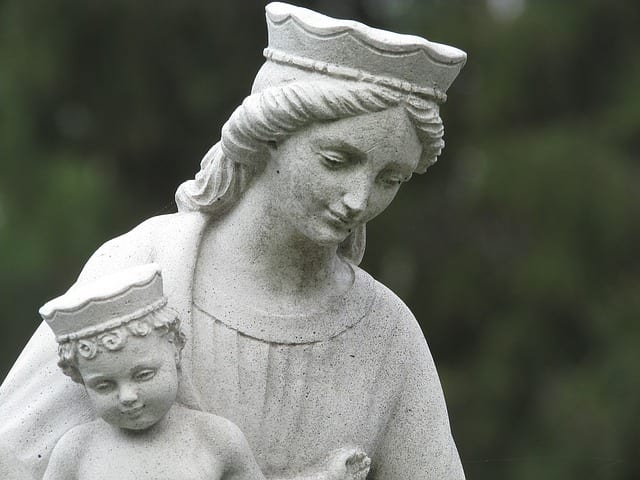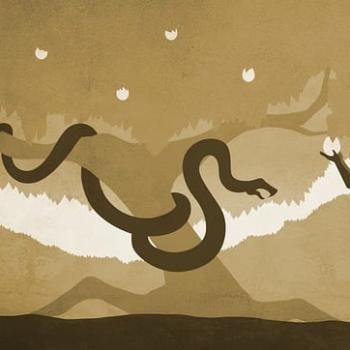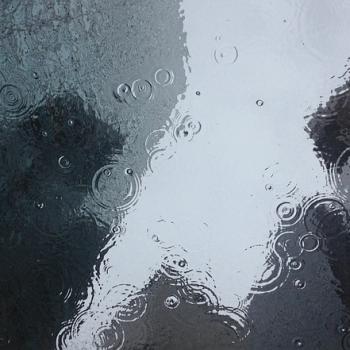
I was at the bus stop with Rosie.
Someday, when this is over, I will take her on field trips to Pittsburgh to see the zoo and the dinosaur museum. Now, we go on field trips to the grocery store every so often, carefully masked and stinking of hand sanitizer. It’s the only trip out of the house we have.
The grandmother of the Baker Street Irregulars came out of her house with one child. She shouted “Hi, Miss Mary!” and went over to say hello, keeping her six foot distance. The child remained silent as if there was duct tape on his mouth instead of a light blue disposable mask– two annoyed green eyes between a strip of blue and a shock of messy blond hair.
The Grandmother of the Baker-Street Irregulars is something like a plump, red-headed, Appalachian version of the Virgin Mary icon that was painted on the side of Our Lady of Bethlehem Kindergarten, which I attended thirty years ago. That icon showed Mary embracing a gaggle of unruly children of all ages and races, and so does she. She has an eternally fluctuating number of offspring in the house at any given time. In addition to her grandchildren, she has nieces and nephews and friends who might as well be nieces and nephews all over the street. Rosie is one of her surrogate nieces. That boy in the blue mask is a grandson.
The boy used to live with his grandfather, his father’s father. He had been in the house when his grandfather hit his head while inebriated and died on the floor. He had to take medication to help him sleep. Now he lives with his mother’s mother, five or six half-siblings, and an endless parade of cousins, in the house next to the bus stop, and he’s making progress. All the children in that house are making progress.
Grandmother told me to thank my friends for getting the children clothes for school. They hadn’t been able to obtain the precious, elusive school clothing voucher that our local Department of Family Services awards to the poor people who jump through the right hoops. Without it, her children wouldn’t have had a scrap of clothing that wasn’t worn out. They get lots of food thanks to the food pantry and the EBT card, but clothes are scarce. I’d managed to scare up a couple of gift cards and boxes of gently used clothes by asking my friends online. Now the second youngest, who is four and still can’t speak very well, would start preschool with a beautiful set of brand new dresses.
“They fit her and everything!” said Grandmother.
If you know what it’s like to shop for toddler clothing with nothing but a thrift store to choose from, you know what a miracle it is to have clothes for a child that actually fit, rather than making do with a size too small or too big.
“So, are they going to school this year?” I asked, trying not to look nervous.
Yes, most of them are going to school. The eldest asked to take her lessons at home with distance learning, but the little ones are going back.
“They’re gonna have them sit on the bus every other bench,” Grandma said cheerfully, “and they’ve only got twenty-five kids per classroom now.”
I tried to smile.
Every other bench on the bus and twenty-five children per room sounded about as effective as deflecting bullets with tissue paper. But then again, so is riding the city bus to the grocery store with my eight-year-old in a cotton mask, and that was what I was doing. No one is safe.
We chatted about life in LaBelle, which is hectic for me and exponentially worse for a grandmother with between five and twenty children at any given time. I asked why there’d been a police car and a fire engine at her house last week. She said that it was all a mix-up; there were other police raiding a drug house down the street and these two cars had come to the wrong address. The previous tenant at this house had been a dealer, after all; I still remember the police in SWAT gear one afternoon, a month or so before the Baker Street Irregulars moved in. Our house used to be a drug house as well, before the landlord bought it and rented it to us.
She then mentioned, as if it were a normal everyday annoyance, that one of her grandchildren had been “run over by a SUV.”
This happened last week and I missed the whole thing. The little girl three years younger than Rosie had been playing on the grass on the berm when a big white SUV veered off the side street and struck her. She went flying like a rag doll.
“She looked fine that day, and she’ll be fine soon, but now she’s lying on the sofa with bruises from here to here,” said Grandma, running her hand up the inside of her leg. “They took her to Pixburg. They had to take her in an ambulance all the way to Pixburg. She did fine in the ambulance. She said she went up to Heaven for a minute, she saw Pappy–” meaning the grandfather who hit his head and died, “Pappy, a angel, and Gamma, a angel, and she saw God.”
“I believe it,” I said solemnly, and I do.
Then came the bus, with the driver carefully shielded behind sheets of plexiglass and most of the passengers in masks.
As we boarded, I tried not to worry about the Baker Street Irregulars visiting the hospital during a pandemic, riding the bus sandwiched between empty benches to deflect a virus that blows through the air, trying to social distance in classrooms. That littlest one, who can barely speak, trying to get through her first day of preschool in her new dress. The traumatized boy staring at his teacher over a mask. The infamous Steubenville City Schools, famous for rape, locally known for bullying and cruelty, that seem to keep churning out illiterate adults who don’t leave here. The grandmother, that cheerful Appalachian Maddonna of LaBelle, waiting at home for at least five children to come tumbling in, covered in other people’s germs that could suffocate her so quickly. The little one having visions of God, in an ambulance on the way to Pittsburgh, where we used to go for fun.
In a way, the pandemic changed nothing. They were never not in danger. They were never not going to lead a miserable life. That’s poverty. That’s America. That’s this dejected bend of the Ohio River, where the Rust Belt collides with the Appalachian Mountains. Children are not valued here. Other things are: addiction, cruelty, the environmental destruction they claim will create wealth but rarely has. But not children.
I am still just crazy enough to hope that they make it out of here to something better.
After all, they’ve got a mother now, and a good one.
A mother isn’t nothing.
Image via Pixabay
Mary Pezzulo is the author of Meditations on the Way of the Cross.
Steel Magnificat operates almost entirely on tips. To tip the author, visit our donate page.













